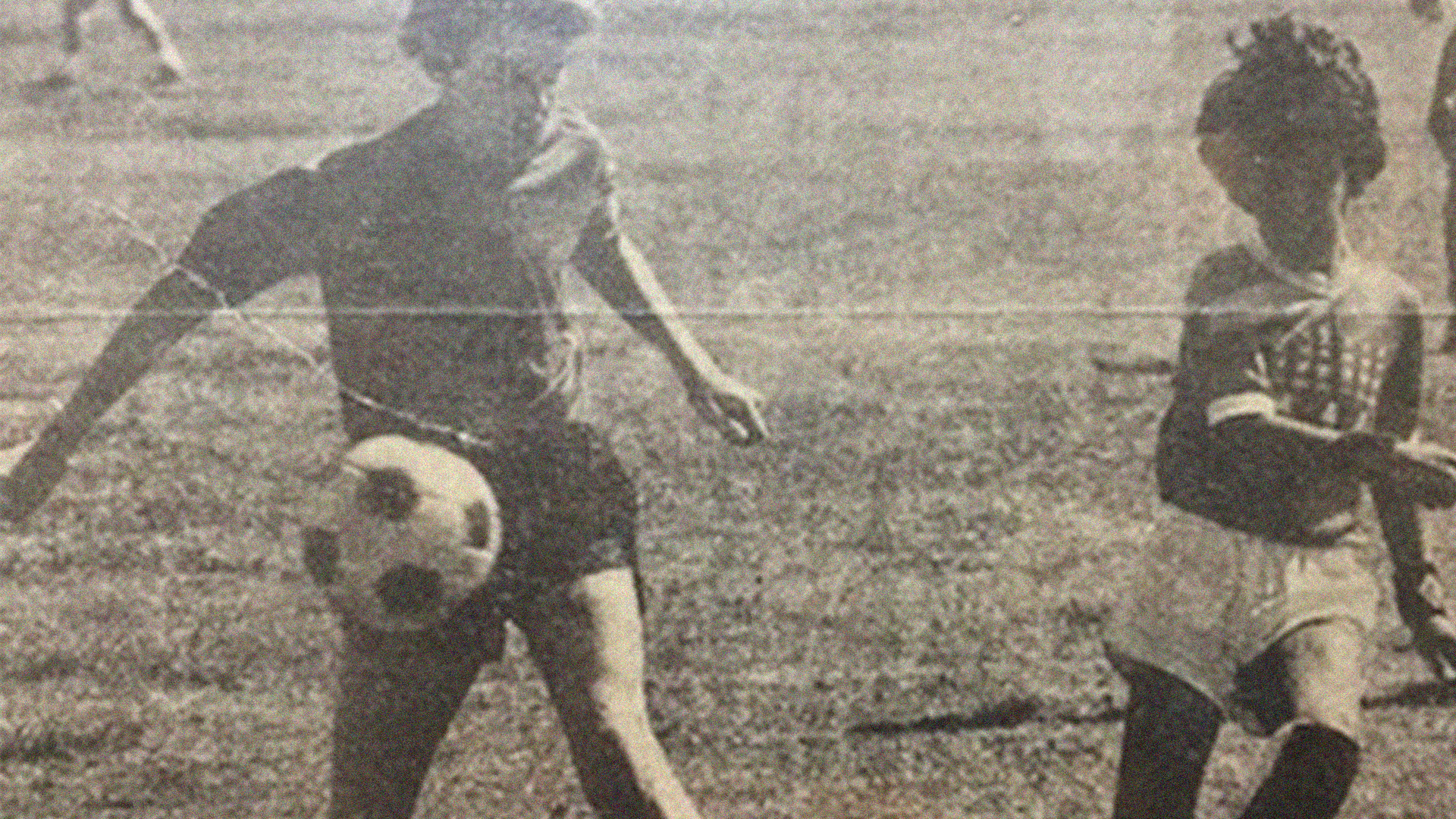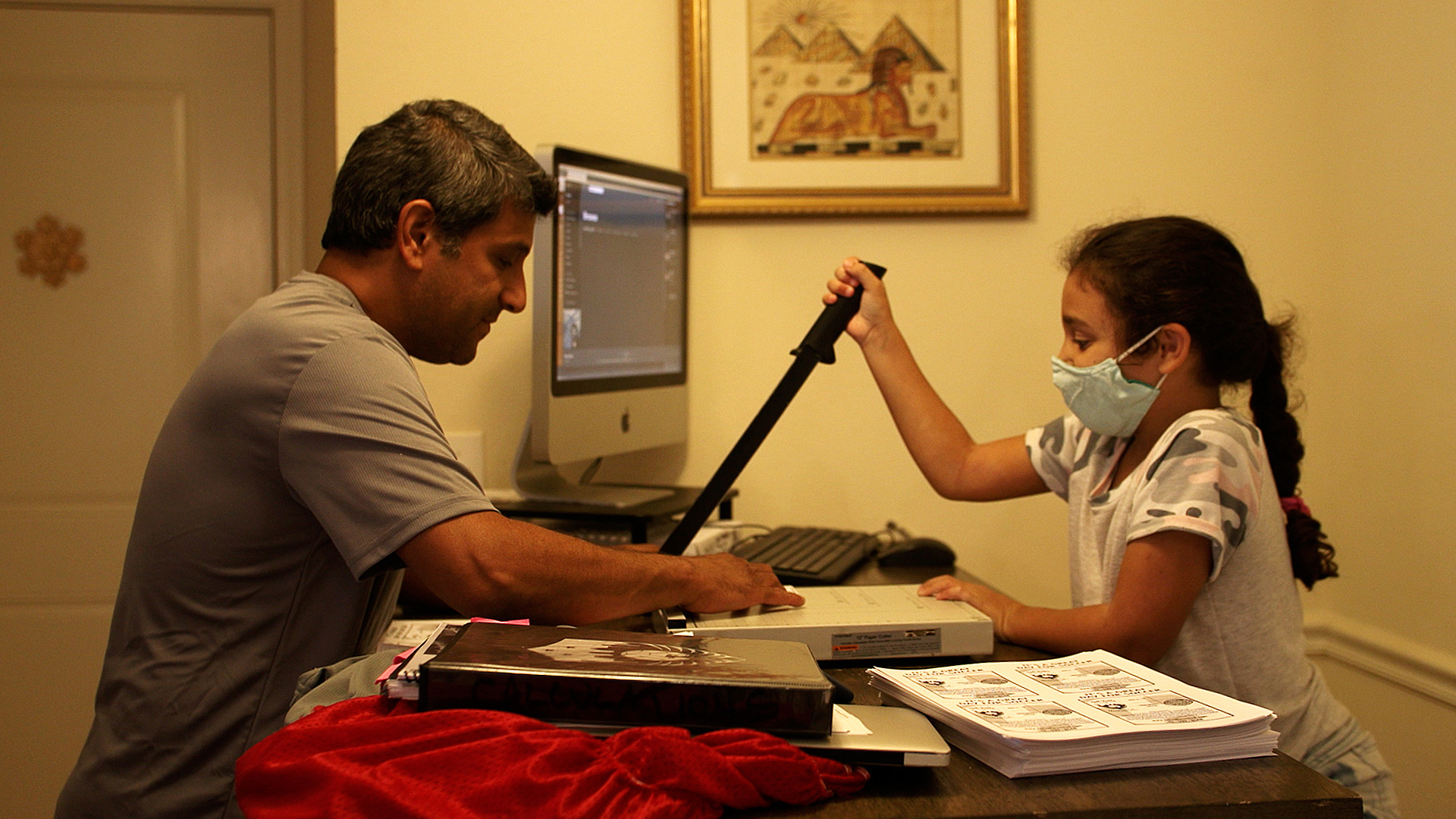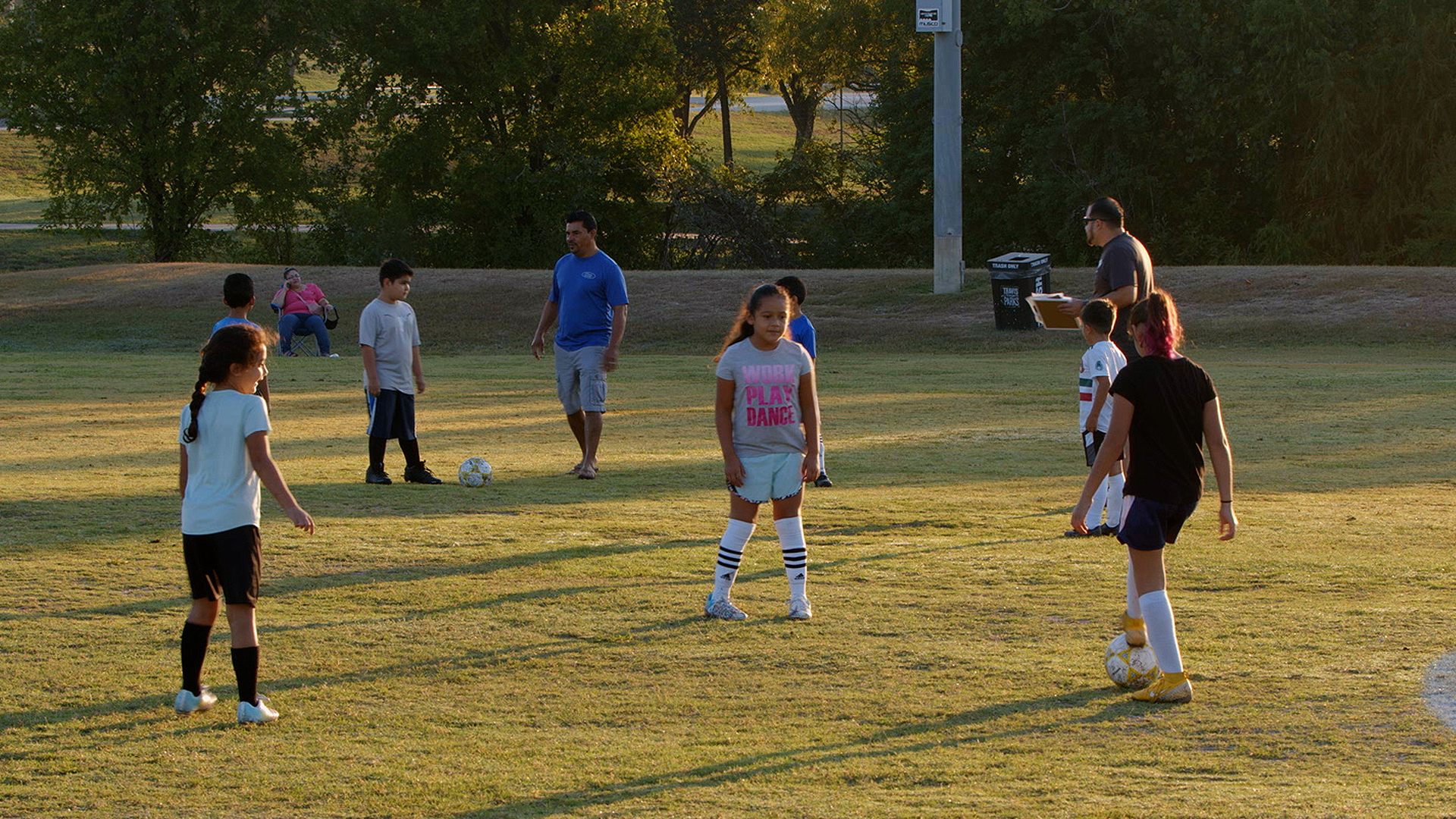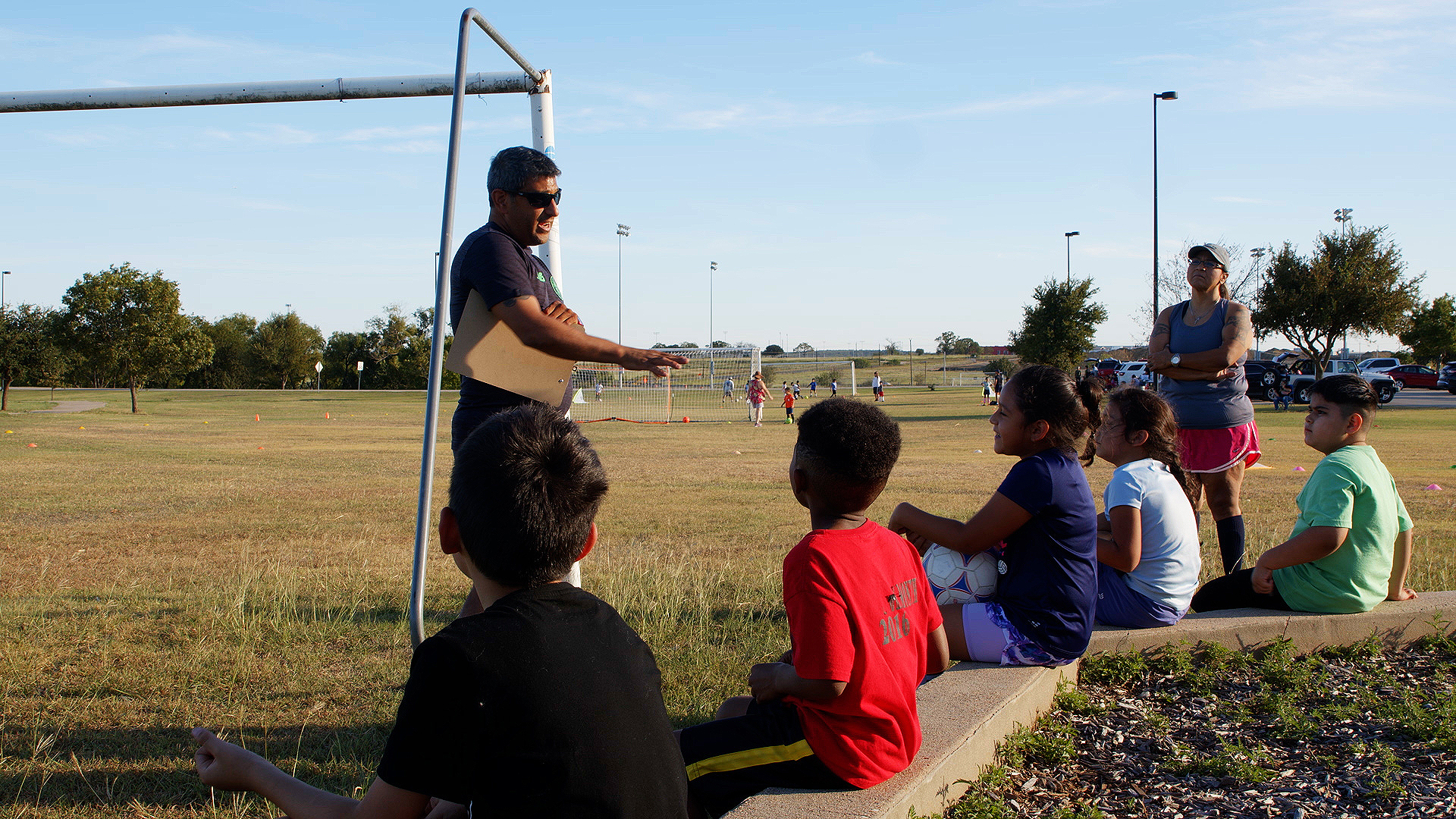More Than A Match
On a warm Saturday morning at Southeast Metropolitan Park, Kenneth "Nino" Sylvia, Del Valle United Soccer Club founder and coach, takes time to prepare the pitch. Sylvia has always found solace in soccer.
“I'm able to just tune everything else out and focus,” Sylvia says. “And being in the moment is sort of what I try to do in my personal life.”
Tuning out of the stresses of life through soccer is one of the tools Sylvia uses to combat anxiety and depression, which he has struggled with his entire life. But it’s a tool not readily available to a vulnerable population in Del Valle who need it. A 2019 study by Children’s Optimal Health cited stress and mental health as issues impacting Del Valle youth. In addition to limited mental health services in the area, the study underlines a need for more recreational opportunities to relieve stress. Sylvia started a youth soccer club to fill this need and provide the community access to the game that helps ease his own anguish.
“I noticed that there was no other soccer club in the area, which just seemed like a tragedy because there's a lot of kids wanting to play,” Sylvia says.
Limited mental health support is something Sylvia can relate to. Growing up in a military family, he moved frequently, which caused him stress and anxiety. Sylvia says he often had to deal with his mental health issues alone.
“My mother's family were uneducated, so they weren't able to tell me, 'Hey, this is what you should do to get yourself out of this situation,’” Sylvia says. “I think ultimately what was driving those problems were my emotions, not being able to deal with them.”
Kenneth ‘Nino’ Sylvia at age 9 (right) kicks a soccer ball in a game in Fort Worth, Texas on November 5, 1982. Photo courtesy of Kenneth "Nino" Sylvia.
So Sylvia turned to the beautiful game — a sport he says helped him with his mental health struggles since he was in elementary school.
“I think soccer is one of those sports where there's a lot of passion involved in the game. … I get very passionate when I play and I kind of wear my emotions on my sleeve,” Sylvia says. “Sometimes life is overwhelming and you just need an outlet.”
Sylvia transitioned from player to coach when his daughter joined a YMCA soccer team. He began coaching in Del Valle when he worked for non-profit It’s Time Texas who partnered with the Leading Enrichment After-School in Del Valle program. This exposed Sylvia to life in the area and ultimately inspired him to start a league of his own.
“Just the disparity in the community compared to other locations where it was almost absurd how many resources they had, and these kids are playing on a dirt field,” Sylvia says. “One thing led to another and I just [said], ‘Let's bring these kids together. Let's give them a place to go, something to do and some inspiration.’”
Kenneth "Nino" Sylvia, Del Valle United Soccer Club founder and coach, and his daughter, Veronica, prepare mini posters to advertise the league at their South Austin apartment on September 1, 2021. Veronica plays on one of the teams while Sylvia’s older daughter, Mirah, helps with logistics like roll calls and sign up sheets.
Thus, Del Valle United Soccer Club was born. The non-profit soccer program is holding its inaugural season this year. Practices are held on Wednesday nights and games on Saturday mornings at Southeast Metropolitan Park. The league consists of five teams.
“Everyone is welcome. … It doesn't matter your skill, ability, level, your race, your age, gender, doesn't matter. Even if you can't afford it. Come, you will play with us,” Sylvia says.
Sylvia says the program is not just about soccer.
“[Its] a soccer club where we are trying to use the game of soccer as a platform to introduce nutrition, social and emotional learning so that we can raise kind, smart, informed human beings,” Sylvia says.
Programs like these are important since mental health services in Del Valle are limited. Integral Care is another organization working to fill that gap. They currently have 18 therapists serving 13 Del Valle ISD schools. Integral Care School-Based Therapist Maryanne Rivera works with kids at Del Valle High School. She says due to the pandemic, stress levels are particularly high this semester.
“Some kiddos actually felt as if their social skills had declined. So not socializing for a year and a half made them feel less confident and able to interact with others,” Rivera says.
Veronica Sylvia (left), Samantha Mendoza (center) and Isabella Adame (right) pass the ball to each other while warming up before the inaugural match at Southeast Metropolitan Park in Del Valle on September 18, 2021. The league is composed of five teams that play each other on Saturday mornings.
But she says sports and other recreational activities, like Del Valle United Soccer Club, can help.
“They can socialize. … It can be a safe place for them to do that where they're not going to be judged,” Rivera says. “Kids learn that they have to work little by little to improve on certain things. Sports is a great way to teach them that. In therapy, that's what we do.”
Still, there’s a lack of recreational activities for Del Valle kids. This is something parent and community member, Thelma Martinez experiences first-hand. While her son joined Del Valle United Soccer Club this season, opportunities like this have not been available in the past.
“There is a lack. I've grown up in this area. I've lived in this area all my life, and it's hard. We have to drive to Austin for the kids to be involved in something,” Martinez says.
Although there is another league in Del Valle, Barça Academy, yearly costs to join can be in the thousands. Del Valle has a high concentration of low-income households, so for many parents, the nonprofit Del Valle United Soccer Club is less of a financial strain with fees just under $100.
Kenneth "Nino" Sylvia, Del Valle United Soccer Club founder and coach, (center) discusses nutrition with his team during a water break while Thelma Martinez, parent and volunteer coach, (far right) provides support at Southeast Metropolitan Park in Del Valle on September 22, 2021. Sylvia says the program is not just about soccer since children learn about nutrition and social and emotional learning as well.
“It's affordable, very affordable compared to some other teams,” Martinez says.
She’s also witnessed the mental health benefits of organized sports. Martinez says that her family has long suffered from mental health issues but since her son started playing soccer this season, she’s already seen a difference in him.
“He's more open. Not as shy. That has to do with a lot of mental health. Like they're closed up and don't like to talk about stuff,” Martinez says. “When they're out there playing, they forget about all the stress, all the problems.”
Besides the stress release that comes from physical activity, Sylvia believes the social aspect of organized sports can also improve mental well-being.
“Belonging to a team, … you feel important. You know your value to your team,” Sylvia says. “It's going to create a sense of belonging and a friendly kind of competition.”
As each kid hones their skills through instruction, practice and games, Sylvia says all of this support is about creating confidence.
“We teach kids that have the ball to keep the ball. Challenge the defender. Take them on. Be confident. Don't give it away. Don't be afraid,” Sylvia says.
And he hopes that confidence will translate into more than just soccer.
“I feel like I could potentially give a kid a chance at something through soccer that they may not get elsewhere, and that makes me feel good because I could potentially change someone's life for the better,” Sylvia says. “Because I wish that I had that when I was a child, that would have been amazing.”
Community journalism doesn’t happen without community support.
Got story ideas, advice on how we can improve our reporting or just want to know more about what we do? Reach out to us at news@klru.org.
And if you value this type of reporting, then please consider making a donation to Austin PBS. Your gift makes the quality journalism done by the Decibel team possible. Thank you for your contribution.
More in Health:
See all Health posts









Contact Us
Email us at news@klru.org